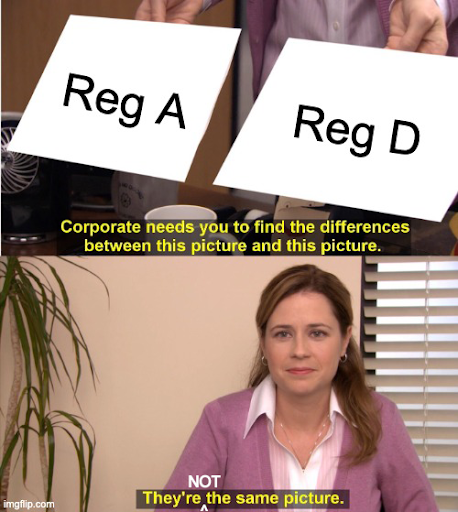Cash accounts now available

Before any company goes public, it must complete an extensive, time-consuming due diligence period. This process helps ensure the company complies with regulations imposed by the U.S. Securities and Exchange Commission (SEC), which governs financial markets.
But some companies want to raise capital without that particular red tape. And if they qualify for exemptions such as Regulation A and Regulation D, they can avoid some of the SEC’s registration requirements. Understanding the differences between Reg A and Reg D — two of the most common exemptions — is essential for investors evaluating opportunities in private secondary markets. This shift reflects broader changes in how investors access growth-stage companies in the private market — explored in more depth here.
There are plenty of advantages for a company that qualifies for an SEC exemption. The business can potentially raise capital without the onerous and costly requirements of full registration.
These exemptions can be just as advantageous for investors as well. In certain scenarios, they are even open to non-accredited investors, democratizing access to the private market.
Here’s everything you need to know about Reg A vs Reg D exemptions before diving in.
Think of Reg A as a “mini IPO” for companies that aren’t going public. This exemption allows both accredited investors — financial institutions or high-net-worth individuals — and retail investors to purchase shares. Updates to the exemption in 2015 created two tiers under which private companies can sell their securities, each with its own particulars:
Reg A offerings enable a broad range of investors to access private companies. And varying transparency requirements provide those investors with more information to analyze.
However, these early-stage investments may also carry a higher risk than public equities.
Reg D offerings are subject to even fewer disclosure requirements with the SEC. This might be attractive for businesses poised for growth and looking to quickly raise capital, as the process is generally faster and cheaper than Reg A or a traditional IPO.
Issuers under Reg D are required to submit Form D — a short document including basic contact information for the company and some details about its offering. The form isn’t subject to SEC review or qualification, however, meaning the company can immediately get to raising capital.
Reg D offerings also tend to carry more restrictions for investors than Reg A. Commonly-used rules 506(b) and 506(c) limit who can invest and restrict issued securities, potentially making them more difficult to liquidate. Additionally, Reg D is almost entirely limited to accredited investors, which describes individuals with a certain net worth or who meet specific professional criteria, as well as financial entities like banks and insurance companies.
Accredited investors are using this access to get exposure to promising private companies much earlier in the funding cycle.
Here are the specifics prospective investors should know.
Reg D offerings afford investors access to unique private opportunities, which may have high growth potential, given the speed and cost benefits of Reg D for startups.
However, Reg D investments are typically less accessible and transparent for retail investors than Reg A offerings, while carrying similar risk profiles.
Before sinking your money into a Reg A or Reg D offering, it is important to determine which option is best for your investment goals.
Consider your risk tolerance and liquidity concerns. Some of these securities may come with long lock-up periods — Reg D securities typically can’t be resold to the public for the first six months to a year after purchase, for instance. Some investors choose to enter closer to exit, where timelines are shorter and the path to liquidity is clearer. That said, it is increasingly possible to sell them on the private secondary market, with the emergence of platforms like Augment*.
Both Reg A and Reg D offerings come with opportunities and risks. Neither is inherently “better.” As always, investors considering these unique opportunities must be sure to align their strategy with their regulatory eligibility, risk appetite, and financial goals.
Sound equity management practices can help investors make the most of either path while reducing potential friction during liquidity events.
*Securities transactions are executed on Augment Capital, LLC's ATS and offered through Augment Capital, LLC (member FINRA/SIPC).
Important Disclosures: Isnvesting in private securities involves substantial risk, including the potential loss of principal. Private securities are typically illiquid, have limited pricing transparency, and often require longer holding periods. These investments are available exclusively to qualified accredited investors and offer no guarantee of returns. Additionally, past performance of private securities does not indicate or predict future results.
FOR ACCREDITED INVESTORS ONLY: Under federal securities laws, private market investments on this platform are available exclusively to Accredited Investors. Verification of status required before investing. Private investments involve significant risks including illiquidity, potential loss of principal, and limited disclosure requirements. "Augment" refers to Augment Markets, Inc. and its affiliates. Augment Markets, Inc. is a technology company offering software and data services. Investment advisory services are offered through Augment Advisors, LLC, an SEC-registered investment adviser. Brokerage services are offered through Augment Capital, LLC, an affiliated broker-dealer and member FINRA/SIPC. Registration with the SEC does not imply a certain level of skill or training. Neither Augment Advisors, LLC nor Augment Capital, LLC provide legal or tax advice; consult your attorney or tax professional regarding your specific situation. For additional information, please refer to Augment Advisors, LLC’s Form ADV Part 2A (Firm Brochure) and FINRA BrokerCheck.